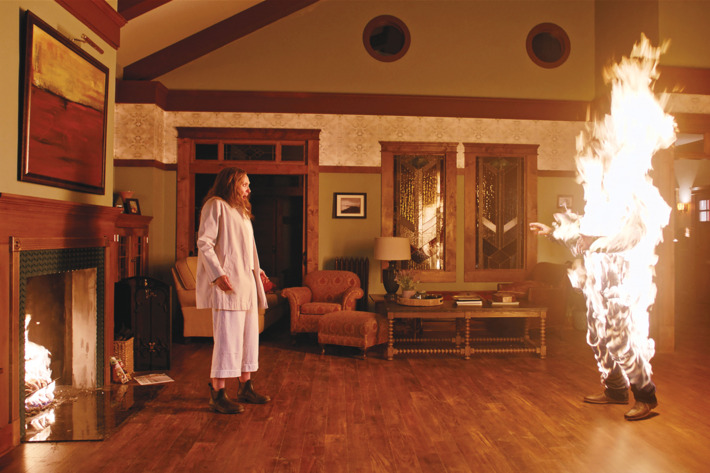I first began my ignominious career at CineDump by bemoaning the fact that I would never experience something as powerful, soul-shattering, or upsetting as the first run of Friedkin’s The Exorcist HERE. I’ve never been one to be seduced by too-easy tales of the good ol’ days long gone, but sitting pinned into some tacky orange 1970’s seating while the people around me screamed, vomited, and ran for cover---oh, my dear, this is why sick people get into horror movies in the first place: the experience.
We could watch cartel videos if we wanted gore or tune in to the news if we wanted tragedy, but that’s not what we want. We want curated suffering.
And that, dear people of CineDump, is what Hereditary is.
I hate reviews that don’t tell me anything about the plot, and with a few exceptions, I don’t write them, but in this case, I’m going to refrain from telling you any more than you can see in the lovely and much-Tweeted trailer.
I want to dig all into the vagaries of this nasty, nihilistic, sadistic beauty, but I think I’ll wait a while. Payday ain’t until the 15th for most people, so in the spirit of human sisterhood and mutual broke-ness, I’ll hold off on any juicy, juicy spoilers. What follows is merely a highly subjective, completely emotional and scientifically unmoored exploration of the power of this mean, gorgeous film and what it means for a horror fan.
So, now that we’re past all that, let’s talk about curated suffering.
As a contemporary art slut (an as yet unrecognized but still debilitating paraphilia), I know that a curator is like a director, a visual storyteller who moves a viewer through image after precious image, unfolding a narrative through placement, arrangement, accident, and style. What’s left out is tantalizing, what’s there is even better.
And that’s what director Ari Aster does in his first horror outing. It’s a bad, wicked, sad world we live in, that’s the problem for horror movie fans these days, isn’t it? In a time where a woman is more likely to raped than paid a living wage, where immigrant children are ripped from families and placed in our famously mismanaged foster system, and school shootings are becoming more routine than standardized testing, it’s a hard time to look for a release. And really, what is the movie community doing to help us get that nice, cathartic thrill? Bland superheroes. Remakes. Small stories retold for the millionth time.
Check, please.
But Hereditary is a rare thing--it takes big ideas and reduces them down to a specialized, boutique experience of exquisite torment.
In my review for A Ghost Story HERE, I talk about the film’s almost too naked, too real depiction of grief in the in/famous pie eating scene. But what Hereditary does with the idea of grief, the way it’s explored and mercilessly dissected is something I was not ready to face. While there are some truly visceral shots in this movie, the moments that elicited the biggest reactions, both from me and my fellow movie-goers, were the too terribly intimate ones--a character shrieking in inconsolable loss, a conversation about guilt and death that sears the viewers as badly as the characters enduring it, a dream sequence that is traumatic in its revelations. By the time all the Lovecraftian hijinx of a frankly too Rosemary’s Baby-inspired gang of blasphemous Baby Boomers kicks in, the audience is too worn out, too torn down by the film’s real terrors to care.
The unsettling, ugly thing about Hereditary isn’t its overly arcane final ten minutes or its gut-punching gore (though, I have to say, casual fans of horror films beware--this is upsetting stuff) but the unrelenting study of grief it presses on its unsuspecting viewers.
Hereditary shys away from everything horror movies have recently tried to be. Loud, splashy, jump-scare ridden, endless gore fests--all those things are good, even fun additions to a film, but where Hereditary succeeds is in it’s dogged, unglamorous, proudly hideous exploration of one of the most horrifying states humans must endure--bereavement. Hereditary doesn’t try to give us every sorrow and fear and suffering out there. No, that would be too simple. Instead, it starts with the trauma of loss and forces the viewer, ready or not, to follow it down a long and twisting path into an endless maze of despair. If you’ve never faced the loss of a loved one, it’s a monstrous guided meditation. If you have, it’s a PTSD-inducing phantasmagoria.
In my well-attended, mostly full viewing of Hereditary, no one ran for safety, no one vomited, no one screamed. There were no Exorcist level theatrics.
But in that quiet, airless room, I heard softer things--gasps, groans, even a few whispered, strained curses. As I left the theatre, people grouped in the hallway to giggle nervously and compare notes. For days afterward, I couldn’t shake the things I had seen, and if I believe the posts I see on social media, a lot of other people can’t either.
No, Hereditary isn’t the Exorcist, but 2018 isn’t the 1970’s. It’s a different world with different needs and different fears and a newer, stranger sense of alienation. I don’t have a story of midnight excess to tell along with this film like I hoped I would.
But, in a very real, very deeply painful way, Hereditary made me face and ruthlessly relive the horrors of grief, the brutality of loss, and sitting in that theatre, hemmed in by nervous laughers, hardened horror veterans, mindless, endless talkers, I know, for a few terrible, awful moments, they felt that too.
And leaving that theatre, driving home through a night that felt a little darker than it should have, I had to concede:
People who spend their lives trying to be scared are dying to face something.
Because of Hereditary, like it or not, the ones who needed to, did.
How’s that for an experience?
Pennie Sublime






